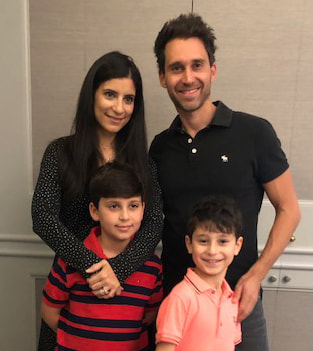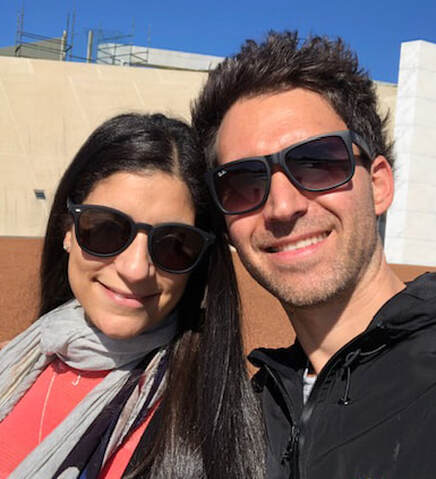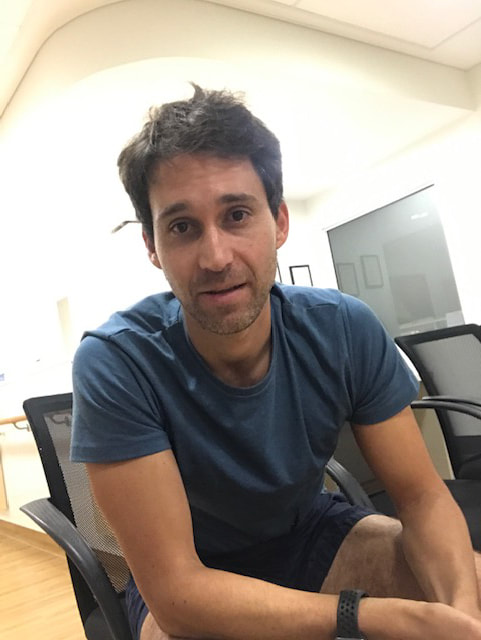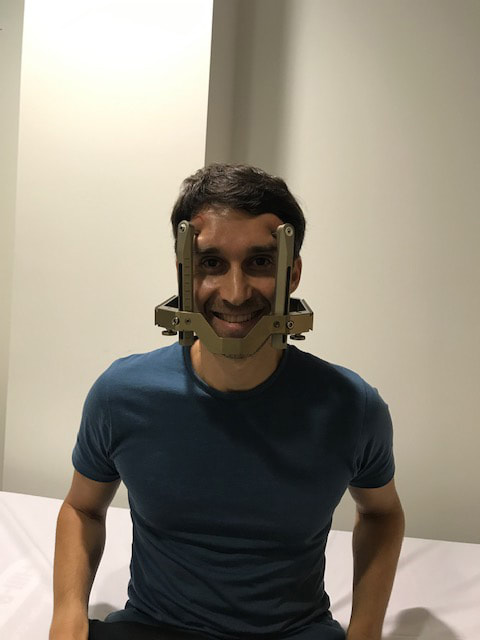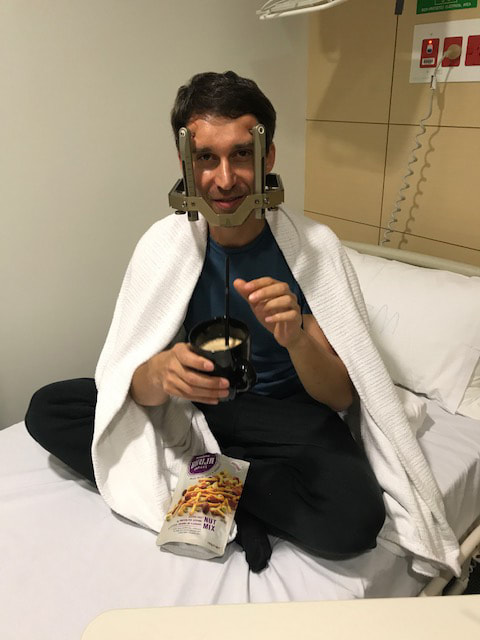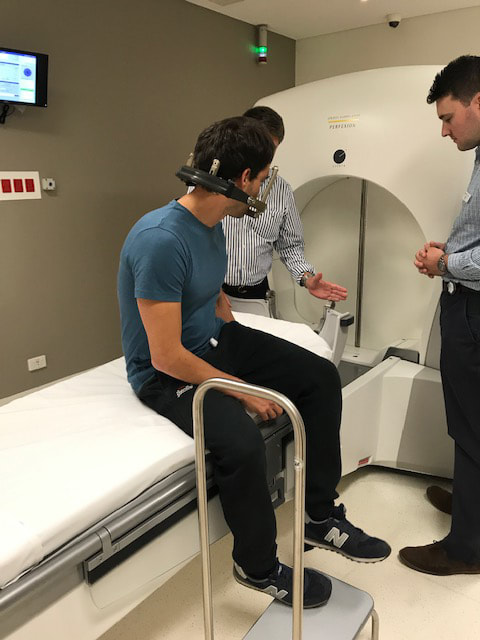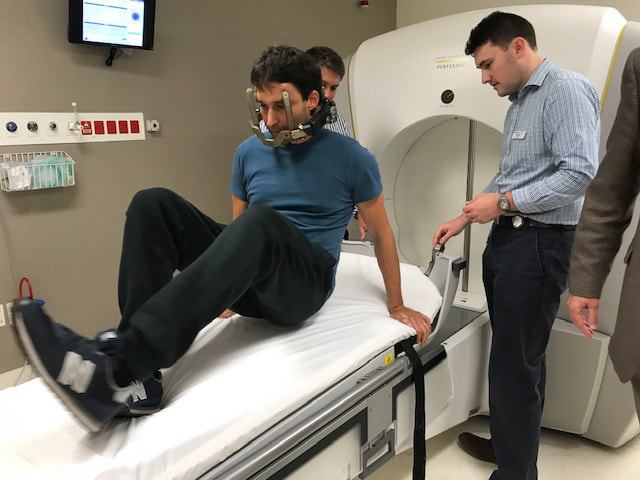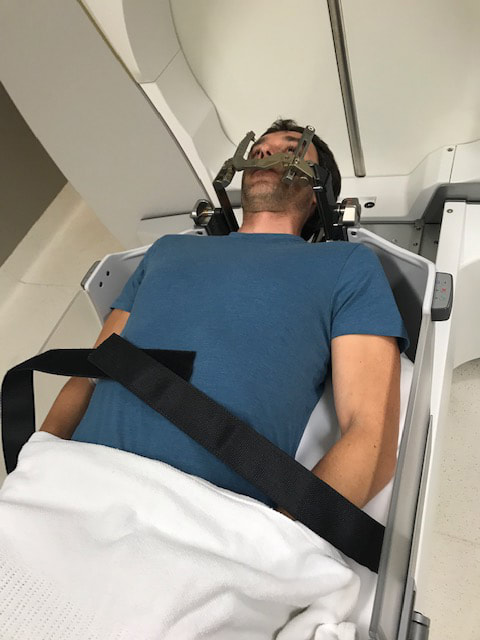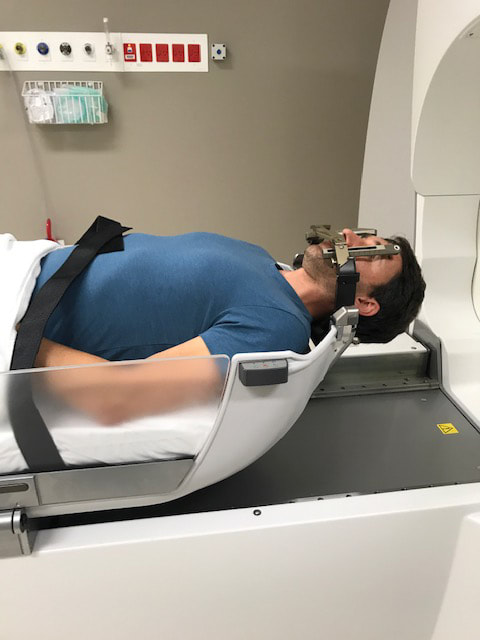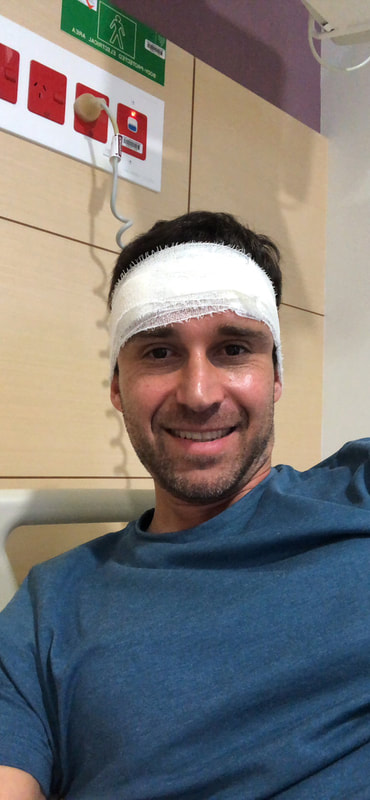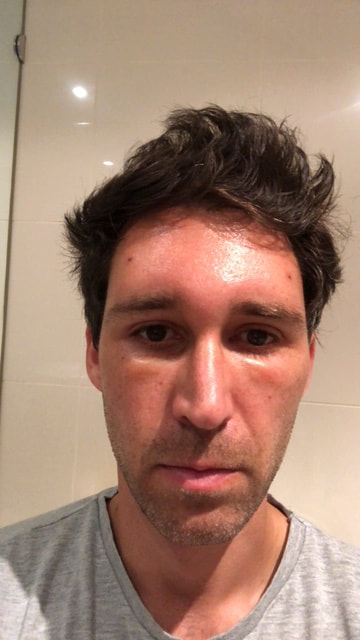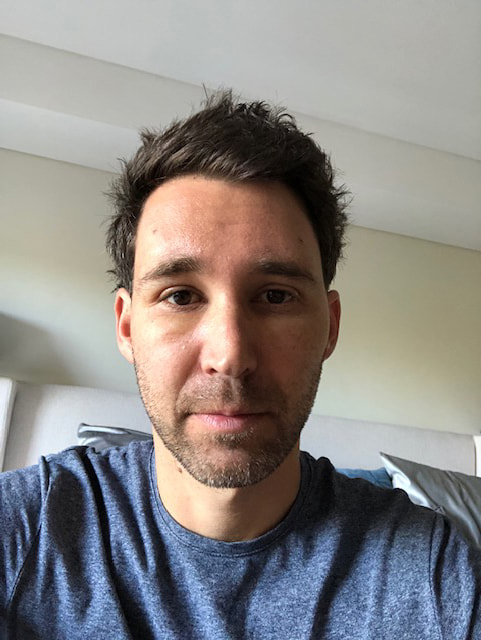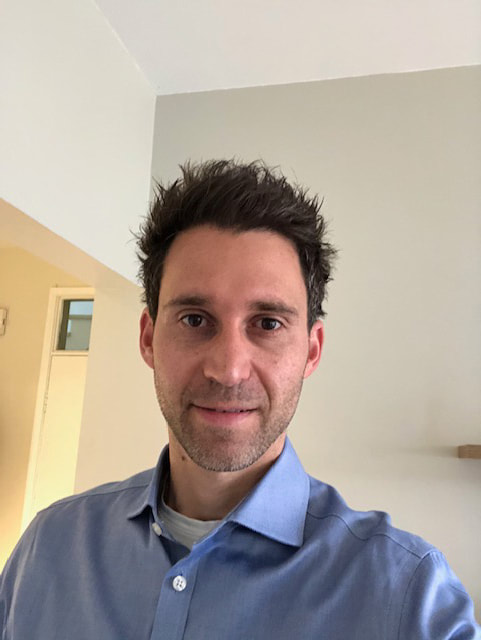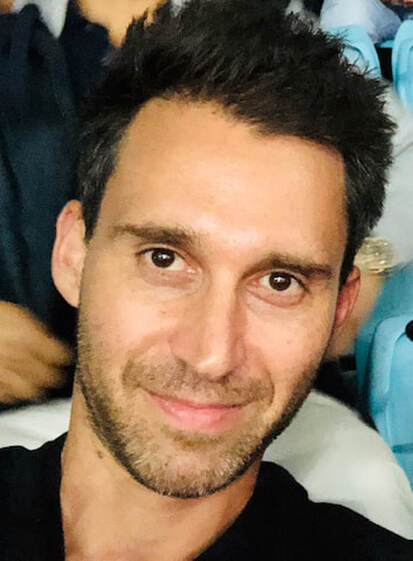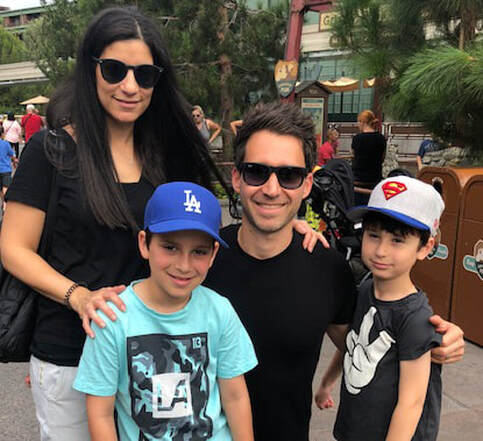BRAIN TUMOR FIGHTER SPOTLIGHT
Brain Tumor Fighter Spotlight #2: Keith Lionetti (coming soon!)
Brain Tumor Fighter Spotlight #1: Mark Lazarus (posted June 10, 2019)
|
Mark Lazarus is a 39-year old lawyer who currently lives in Sydney, Australia. Mark is married and spends a lot of time hopping back-and-forth between Australia and London, where his wife is from. In October of 2017, Mark was diagnosed with an Acoustic Neuroma/Vestibular Schwannoma. Mark's path for recovery was to "wait and see" for 6 months, and then made the decision to undergo Gamma Knife Radiation treatment which took place on April 9th of 2018. Mark's hobbies include spending time with his family, running, going to the gym, and hustling 24/7 building his business. Mark and his loving and supportive wife currently have two boys, ages 8 and 5. His wife just recently announced that she is pregnant and that they will be expecting their third child, a baby girl, in November of 2019!
|
|
"I cannot thank my wife enough. She has and continues to be so supportive and she always encourages me to have a positive mindset, focus on the good and stop looking for the worst case scenarios!"
-Mark Lazarus |
What was your initial reaction when you were diagnosed with a brain tumor?
When I was first diagnosed with a brain tumor, I was absolutely shocked. I was devastated and actually burst into tears. I then ran to my ENT’s surgery, which was a short walk from my office as I didn’t know what to do next, and my ENT was the one that had sent me to get an MRI in the first place after conducting some hearing tests. He said, just get an MRI to be on the safe side and to rule anything out. I never in my wildest dreams thought they would find anything. I kept thinking, why me? What did I do to deserve this and what might have caused it? While I appreciate there are way worse brain tumors one can get as an Acoustic Neuroma is completely benign, I couldn’t help but feel angry, confused and terrified all at the same time. How did you approach sharing this information with those around you? I tried to call my wife straight away but she was with clients and she wasn’t answering her phone. I must have called her like 10 times. I then told my dad who was also in a meeting with a client, so that’s when I just took off to the ENT to get an appointment. I eventually told my whole family, and for a day or two, some members didn’t even bother to make contact, probably because they didn’t know how to handle the news or what to say to me. It’s not a conversation you have every day and so I didn’t really know how to convey the news other than to just say it. |
How did your family and friends react to the news?
I got some fantastic support from some family members and very poor support from others. My wife was my rock and she came home as soon as she heard the news and spent the afternoon with me. I left my office as I couldn’t concentrate and my wife and I went for a walk along Bondi Beach to discuss and work out a plan of action. I cannot thank my wife enough. She has and continues to be so supportive and she always encourages me to have a positive mindset, focus on the good and stop looking for the worst case scenarios! My friends were shocked. Some were supportive and some didn’t give it much thought. You certainly realize quickly who actually gives a fuck and who couldn’t care less.
I got some fantastic support from some family members and very poor support from others. My wife was my rock and she came home as soon as she heard the news and spent the afternoon with me. I left my office as I couldn’t concentrate and my wife and I went for a walk along Bondi Beach to discuss and work out a plan of action. I cannot thank my wife enough. She has and continues to be so supportive and she always encourages me to have a positive mindset, focus on the good and stop looking for the worst case scenarios! My friends were shocked. Some were supportive and some didn’t give it much thought. You certainly realize quickly who actually gives a fuck and who couldn’t care less.
What made you choose your path of treatment?
I chose Gamma Knife radiation treatment after months and months of research and many visits to specialist neurosurgeons and radiation specialists. I must have or seen or spoken with at least 10 different specialists across Australia, London and California. Given the size of my tumor, I knew I was still a candidate for radiation and after doing my due diligence on the different approaches to surgery, the side effects and recovery time and then doing the same for radiation, it was a no brainer - no pun intended. While I am quite young still for radiation, I was prepared to take the risk with gamma knife given its high success rate, lower chance of facial weakness and higher chance of preserving some hearing in the AN ear. It was also a much quicker recovery time, and because we only recently moved back to Sydney (from London), and I was only 6 months into building my own law practice, surgery was not the path I wanted to go down. Furthermore, I was and still am terrified about facial palsy and/or weakness and I wanted to try and avoid this at all costs. It’s been just over a year since I had gamma knife and while I still have some intense symptoms internally (i.e. the average person wouldn’t notice when looking at me), to the outside world, people wouldn’t even know I’m living with a brain tumor. I do have a constantly blocked right ear (like when you have just got off a plane and need to pop your ear, but this lasts 24/7), along with a numb sensation down the right side of my face and gums, as the AN is pushing against my Trigeminal Nerve. Since my gamma knife treatment, the tumor has shown signs of necrosis and slight shrinkage, so it’s all positive. My next MRI is at the end of June and I’m hoping and praying that my AN is continuing to shrink!
I chose Gamma Knife radiation treatment after months and months of research and many visits to specialist neurosurgeons and radiation specialists. I must have or seen or spoken with at least 10 different specialists across Australia, London and California. Given the size of my tumor, I knew I was still a candidate for radiation and after doing my due diligence on the different approaches to surgery, the side effects and recovery time and then doing the same for radiation, it was a no brainer - no pun intended. While I am quite young still for radiation, I was prepared to take the risk with gamma knife given its high success rate, lower chance of facial weakness and higher chance of preserving some hearing in the AN ear. It was also a much quicker recovery time, and because we only recently moved back to Sydney (from London), and I was only 6 months into building my own law practice, surgery was not the path I wanted to go down. Furthermore, I was and still am terrified about facial palsy and/or weakness and I wanted to try and avoid this at all costs. It’s been just over a year since I had gamma knife and while I still have some intense symptoms internally (i.e. the average person wouldn’t notice when looking at me), to the outside world, people wouldn’t even know I’m living with a brain tumor. I do have a constantly blocked right ear (like when you have just got off a plane and need to pop your ear, but this lasts 24/7), along with a numb sensation down the right side of my face and gums, as the AN is pushing against my Trigeminal Nerve. Since my gamma knife treatment, the tumor has shown signs of necrosis and slight shrinkage, so it’s all positive. My next MRI is at the end of June and I’m hoping and praying that my AN is continuing to shrink!
|
For those embarking on their own brain tumor fighter journey, describe what your treatment was like?
My treatment was relatively straight forward compared to invasive brain surgery. The gamma knife procedure looks and sounds scary, but it’s pretty straight forward. You arrive at the hospital in the morning, get checked in, and then it’s pretty much straight to it. The surgeon and their team arrive in your room and get you set up for the frame, but first I asked for a very strong sedative. This took the edge off before they got on with the frame fitting. The frame fitting process consisted of 4 local anesthetics - 2 into your forehead and 2 behind your head. This part is painful in the beginning, like a sharp sting, but the anesthetic works fairly quickly and then your whole head goes numb. Then the frame goes on. It’s a weird feeling having it screwed to your skull, like a lot of pressure closing in, but it’s not too bad. At one point it hurt and they gave me more local anesthetic, but then it felt okay. Once the frame was on, and after a short while, I barely noticed the pain and got quite used to the frame. I was even given something to eat while I was waiting for the treatment. Eating proved to be a challenge while the frame was on, but thanks to a straw, I was able to take in some fluids. After my treatment had been planned (this took about an hour or so), it was time to go into the gamma knife machine. I lay down on the table and the frame was locked into place. I was told I needed to be in the machine for 44 minutes, and as I was being maneuvered in, I remember being asked if I wanted to listen to some Michael Bublé to calm the nerves. Yes, Michael Bublé. After 44 minutes, I was done. They pushed a button, I moved out of the machine (which was painless), in fact once finished, I asked them whether it was actually on during the 44 minutes I was in there and whether we needed to do it again to be on the safe side. They assured me it was on and that I was done. I was then monitored for a few hours back in my room, had a sandwich and a few hours later, I was discharged. My wife drove me home and I rested up the next day. The day after the procedure, my face swelled up quite a lot from the local anesthetic leaving my face, and it looked like I had gone a few rounds with Floyd Mayweather, but I wasn’t in too much pain. I took the day off to rest, but the day after that, I went back to work. Within a week, the swelling had subsided and the pin sites had closed and were barely noticeable. Today, you can’t tell and I have no scaring from the pin sites. My head was tender for at least a month, but it wasn’t bad, and in fact, less than 6 weeks after the procedure I ran a half marathon. So far, my tumor has shown signs of shrinkage and necrosis, so from my perspective, I would recommend this treatment over surgery, well let’s just say, if it continues to shrink (I’ll know in a few short weeks), it will be one of the best decisions I have ever made in my life. My hearing is deteriorating, I do have facial numbness on my right side which is unnoticeable to the outside world as my tumor is pressing on the Trigeminal Nerve, but overall, I feel I have definitely gotten off lightly compared to if I had gone down the surgery route. Yes my tumor is still there, and yes I constantly worry about it and panic every time it gets close to my next MRI scan, but that is the life of an AN warrior. I am positive though and hopeful for the future. The gamma knife process is no picnic, but I am very happy with my treatment and thank all those who treated me here in Sydney. The team was brilliant! |
"The gamma knife procedure looks and sounds scary, but it’s pretty straight forward. You arrive at the hospital in the morning, get checked in, and then it’s pretty much straight to it."
-Mark Lazarus |
"I am positive though and hopeful for the future." -Mark Lazarus
What have the results been since your method of treatment?
The results have been good. As mentioned, the tumor is showing signs of necrosis (blackening in the middle and death to the tumor) and it has slightly shrunk since my last MRI. My next MRI is in mid-June, and I am hopeful it continues to shrink. If it does, I have been informed by the surgeon that my next MRI will be in 1 year as opposed to 6 months.
What have been the most challenging parts of your journey as a brain tumor fighter?
The results have been good. As mentioned, the tumor is showing signs of necrosis (blackening in the middle and death to the tumor) and it has slightly shrunk since my last MRI. My next MRI is in mid-June, and I am hopeful it continues to shrink. If it does, I have been informed by the surgeon that my next MRI will be in 1 year as opposed to 6 months.
What have been the most challenging parts of your journey as a brain tumor fighter?
- There is not a lot of information out there. By that, I mean there is information, but it is not constantly being updated and so there are reports and stats from several years ago. It is difficult to obtain reliable information and personally, I am not a fan of posting on the AN groups. In some ways, those that are active on those groups can be very supportive, but there are many on those groups that share horror stories and you end up feeling worse off after reading the stories. Those that have had good experiences with AN treatments generally get on with their lives and try to put the experience behind them. My advice is to be careful not to get drawn in and let the negativity unravel all the positive steps you are making at conquering the diagnosis. If you want support, reach out to those that have been through the treatment you are embarking on, and speak to them privately to get the information you need. There are plenty of people that can steer you in the right direction and give you some very solid advice without scaring the sh!t out of you!
- It can be a lonely journey. If all goes to plan, then hopefully the worst case scenario is some loss of hearing, tinnitus, balance issues etc. but there are many symptoms we AN warriors go through that are not visible to the naked eye including those that are mentioned, ear fullness 24/7, facial twitching at times, headaches, constant buzzing, numbness etc. These symptoms, particularly if you have more than 1, can be debilitating but yet no one knows you are suffering, so often your illness is forgotten. Now, that may be a good thing as you don’t want people to feel sorry for you or treat you differently, but it’s still a difficult pill to swallow and hard to accept that you are going through these things, suffering in silence and yet everyone thinks you are just fine.
- The unknown. Always being on edge whenever you approach your next MRI, worrying the tumour is growing or coming back, worrying you are suddenly losing hearing in your other ear etc. You may buy yourself some time in between scans, but there is always that constant worry you live with.
|
"I sometimes take life too seriously, but life can change in an instant. Live every moment, be present and focus on the positives."
-Mark Lazarus |
How has your perspective on life changed since becoming a brain tumor fighter?
My perspective on life has definitely changed. I have a brain tumor, yes, it’s hard to say out loud, and when I was first diagnosed, I couldn’t help but think, why me? What did I do to deserve this? Am I a bad person? Is it because of extensive use of my mobile phone, even though the AN is on the opposite side to my phone ear? But then, after time, I started to realize that I have a brain tumor, and it sucks, but it’s benign. It can be treated, albeit, there are side effects (some severe), but it won’t kill me, at least if treated early. In fact, it’s one of the best brain tumors to have and I will be around to see my kids grow up. So in fact, I should be very fortunate as there are people that are far worse off than me. There are people who get diagnosed with cancer and are told they have months to live. Don’t look at it and think poor me. Look at it and think, how lucky am I! It has also taught me to look at the things that are most important in my life - my family and loved ones, friends etc. I am a very ambitious person and always striving to achieve and succeed in life, but this diagnosis does put things in perspective. I sometimes take life too seriously, but life can change in an instant. Live every moment, be present and focus on the positives. I do believe that my AN is partially due to stress. Stress is a massive cause of ailments and disease. This has taught me to try and stress less. I’m not saying it’s an overnight fix, but I am conscious of it and trying to make a concerted effort to do better and live in the moment. |
What's something that the people around you have done to help on your journey as a brain tumor fighter?
People have been really supportive. One person in particular, Tony Flurscheim who runs a few AN groups and is very active in the AN community has been super supportive. I have met him a few times for coffee, he has provided me with some literature and he is always really positive and great at giving advice. Sometimes it’s just about listening. Many people want to share their story with those that get it. If you have any time to help someone who has recently been diagnosed, I urge you to do so. It not only helps them, but you will find it helpful too! There have also been a few other AN warriors around the world who have been amazing - Danny Reynoso being one of them. Hats off to Danny for providing this outlet and for helping others! (editors note: Thank you, Mark! Your check is in the mail!) I have also been given advice to take it slower, spend time meditating, clearing the mind, doing yoga, exercise etc. I haven’t really got into the mediation (although I would like to try it again) but exercise is very important to me. In fact, as I mentioned earlier, I ran a half marathon 6 weeks after my gamma knife surgery and I continue to go to the gym 5 days a week at 5:30AM and run more than 6 miles at least once a week. Keep active as it really helps the mind, body and spirit!
In your experience, what's a misconception that people may have about brain tumor fighters?
A misconception people have about brain tumor fighters is that we have some kind of disease. I have met with some people in business who really wanted to work with me, but when I told them about my AN, I suddenly didn’t hear from them again. Maybe they thought I was going to die or that I wouldn’t be able to step up to the plate. My brain tumor is not a disability. It’s part of who I am now and I work around it. It does not defeat me and it motivates me to do better, be better, act better. Don’t allow people to pity you or feel sorry for you, and don’t be afraid to tell people what you have. If they don’t want to engage with you because of it, then you are better off without them in your lives!
MARK'S CLOSING MESSAGE...
For those embarking on their own brain tumor fighter journey and/or their loved ones, what's a piece of advice you could give them?
For those embarking on their own journey, don’t panic and don’t rush to Google. Dr Google can be very dangerous. Trust me, I know! Also don’t just join every AN association, forum or group, unless you know what you are getting yourself into. I repeat, that many people who remain in those groups have had bad experiences or want to complain to whomever will listen or engage with them. The strong (and there are many) get on with their lives and live a ‘new normal’ to the best of their ability. You’ve got this, don’t let it own you!
That being said, do your research and spend time investigating and meeting with surgeons and/or specialists across the various different treatment options. I saw several neurosurgeons here in Australia, I spoke with surgeons in the US via telephone and I visited some of the best surgeons on Harley Street in London.
People have been really supportive. One person in particular, Tony Flurscheim who runs a few AN groups and is very active in the AN community has been super supportive. I have met him a few times for coffee, he has provided me with some literature and he is always really positive and great at giving advice. Sometimes it’s just about listening. Many people want to share their story with those that get it. If you have any time to help someone who has recently been diagnosed, I urge you to do so. It not only helps them, but you will find it helpful too! There have also been a few other AN warriors around the world who have been amazing - Danny Reynoso being one of them. Hats off to Danny for providing this outlet and for helping others! (editors note: Thank you, Mark! Your check is in the mail!) I have also been given advice to take it slower, spend time meditating, clearing the mind, doing yoga, exercise etc. I haven’t really got into the mediation (although I would like to try it again) but exercise is very important to me. In fact, as I mentioned earlier, I ran a half marathon 6 weeks after my gamma knife surgery and I continue to go to the gym 5 days a week at 5:30AM and run more than 6 miles at least once a week. Keep active as it really helps the mind, body and spirit!
In your experience, what's a misconception that people may have about brain tumor fighters?
A misconception people have about brain tumor fighters is that we have some kind of disease. I have met with some people in business who really wanted to work with me, but when I told them about my AN, I suddenly didn’t hear from them again. Maybe they thought I was going to die or that I wouldn’t be able to step up to the plate. My brain tumor is not a disability. It’s part of who I am now and I work around it. It does not defeat me and it motivates me to do better, be better, act better. Don’t allow people to pity you or feel sorry for you, and don’t be afraid to tell people what you have. If they don’t want to engage with you because of it, then you are better off without them in your lives!
MARK'S CLOSING MESSAGE...
For those embarking on their own brain tumor fighter journey and/or their loved ones, what's a piece of advice you could give them?
For those embarking on their own journey, don’t panic and don’t rush to Google. Dr Google can be very dangerous. Trust me, I know! Also don’t just join every AN association, forum or group, unless you know what you are getting yourself into. I repeat, that many people who remain in those groups have had bad experiences or want to complain to whomever will listen or engage with them. The strong (and there are many) get on with their lives and live a ‘new normal’ to the best of their ability. You’ve got this, don’t let it own you!
That being said, do your research and spend time investigating and meeting with surgeons and/or specialists across the various different treatment options. I saw several neurosurgeons here in Australia, I spoke with surgeons in the US via telephone and I visited some of the best surgeons on Harley Street in London.
|
Mark and his family will be welcoming the newest addition to their family, a daughter, in November of 2019!
|
I was told by some that because of my age, I shouldn’t go down the radiation route. In Australia, Gamma Knife is fairly new, so is Cyberknife (not like in Europe where they have both been around for years), and there isn’t a lot of data going back several years on future outcome. That being said, when I visited the UK, surgeons and radiation specialists all recommended radiation for my tumor, which was medium size at just over 2cm. I went with my gut and decided to go the gamma knife radiation route. So far it’s the best decision I could have possibly made on this journey and I am so glad I did not go the surgery route. Now Radiation may not be for everyone, and many people won’t be able to live with a dormant tumor in their heads for the rest of their lives. Some will just want it out and that’s fine too! But I urge you to do your research, and expand beyond your home town. There are advances in technology all the time, and your home town may be behind the 8-ball. The more research you do, the more you will be equipped to make an educated and full informed decision.
I wish you the best of luck on your journey and do not hesitate to reach out if you need any advice or a shoulder to lean on!! |
